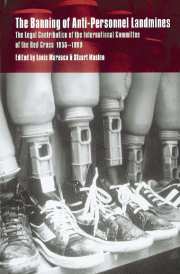 The Banning of Anti-Personnel Landmines
The Banning of Anti-Personnel Landmines Book contents
- Frontmatter
- Contents
- Foreword by Cornelio Sommaruga, President, International Committee of the Red Cross
- Foreword by Ambassador Jacob S. Selebi, South Africa
- Foreword by Ambassador Johan Molander, Sweden
- Introduction
- PART 1 FROM PRINCIPLES TO RULES: REGULATING MINES UP TO THE 1980 CONVENTION ON CERTAIN CONVENTIONAL WEAPONS
- 1 Historical background: the international law governing weapons
- 2 The ICRC's draft rules to protect civilian populations 1955–1956
- 3 Expert contributions to the Diplomatic Conference on the Reaffirmation and Development of International Humanitarian Law Applicable in Armed Conflicts 1973–1977
- 4 The United Nations Convention on Prohibitions or Restrictions on the Use of Certain Conventional Weapons Which May be Deemed to be Excessively Injurious or to Have Indiscriminate Effects, adopted 10 October 1980
- PART 2 THE REVIEW CONFERENCE OF THE 1980 CONVENTION ON CERTAIN CONVENTIONAL WEAPONS: AN INITIAL RESPONSE TO THE LANDMINE CRISIS
- PART 3 THE OTTAWA PROCESS FROM REGIONAL INITIATIVES TO AN INTERNATIONAL PROHIBITION OF ANTI-PERSONNEL MINES
- Index
3 - Expert contributions to the Diplomatic Conference on the Reaffirmation and Development of International Humanitarian Law Applicable in Armed Conflicts 1973–1977
from PART 1 - FROM PRINCIPLES TO RULES: REGULATING MINES UP TO THE 1980 CONVENTION ON CERTAIN CONVENTIONAL WEAPONS
Published online by Cambridge University Press: 03 December 2009
- Frontmatter
- Contents
- Foreword by Cornelio Sommaruga, President, International Committee of the Red Cross
- Foreword by Ambassador Jacob S. Selebi, South Africa
- Foreword by Ambassador Johan Molander, Sweden
- Introduction
- PART 1 FROM PRINCIPLES TO RULES: REGULATING MINES UP TO THE 1980 CONVENTION ON CERTAIN CONVENTIONAL WEAPONS
- 1 Historical background: the international law governing weapons
- 2 The ICRC's draft rules to protect civilian populations 1955–1956
- 3 Expert contributions to the Diplomatic Conference on the Reaffirmation and Development of International Humanitarian Law Applicable in Armed Conflicts 1973–1977
- 4 The United Nations Convention on Prohibitions or Restrictions on the Use of Certain Conventional Weapons Which May be Deemed to be Excessively Injurious or to Have Indiscriminate Effects, adopted 10 October 1980
- PART 2 THE REVIEW CONFERENCE OF THE 1980 CONVENTION ON CERTAIN CONVENTIONAL WEAPONS: AN INITIAL RESPONSE TO THE LANDMINE CRISIS
- PART 3 THE OTTAWA PROCESS FROM REGIONAL INITIATIVES TO AN INTERNATIONAL PROHIBITION OF ANTI-PERSONNEL MINES
- Index
Summary
In its role as depository for the Geneva Conventions, the Swiss government convened a diplomatic conference in the mid-1970s to supplement the existing international humanitarian law. The Diplomatic Conference on the Reaffirmation and Development of International Humanitarian Law Applicable in Armed Conflicts (1974–1977) sought to increase the protection afforded to the victims of armed conflict, particularly against the effects of hostilities, and resulted in the adoption of the two Additional Protocols to the Geneva Conventions of 1949.
In preparing the drafts which were the bases for the diplomatic negotiations, the ICRC did not include prohibitions or restrictions on the use of particular weapons. Instead, because of the potentially sensitive nature of such discussions, it chose to restate the fundamental rules governing the use of weapons in earlier international humanitarian law treaties, which by this time were considered to be part of customary international law.
Nonetheless, in spite of the absence of additional restrictions in the drafts, the experts of nineteen governments requested the ICRC to consult with specialists on the problem of conventional weapons which may cause unnecessary suffering or have indiscriminate effects. The purpose was to have detailed reports and information available should governments wish to address the regulation of these weapons at the Diplomatic Conference.
Three expert meetings were convened between 1973 and 1976:
Expert Meeting on Weapons that may Cause Unnecessary Suffering or Have Indiscriminate Effects, held in Geneva, 26 February to 2 March and 12 to 15 June 1973;
Conference of Government Experts on the Use of Certain Conventional Weapons, First Session, held in Lucerne, 24 September to 18 October 1974; and
Conference of Government Experts on the Use of Certain Conventional Weapons, second session held in Lugano, 28 January to 26 February 1976.
- Type
- Chapter
- Information
- The Banning of Anti-Personnel LandminesThe Legal Contribution of the International Committee of the Red Cross 1955–1999, pp. 19 - 89Publisher: Cambridge University PressPrint publication year: 2000
